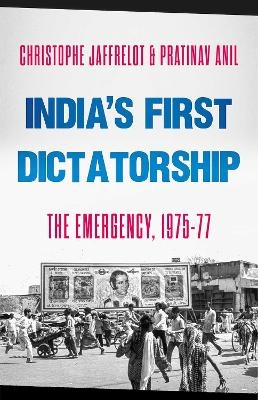
India's First Dictatorship
The Emergency, 1975–1977
Seiten
2025
C Hurst & Co Publishers Ltd (Verlag)
978-1-80526-321-0 (ISBN)
C Hurst & Co Publishers Ltd (Verlag)
978-1-80526-321-0 (ISBN)
- Noch nicht erschienen (ca. Mai 2025)
- Portofrei ab CHF 40
- Auch auf Rechnung
- Artikel merken
In June 1975 Prime Minister Indira Gandhi imposed a state of emergency, resulting in a 21-month suspension of democracy. Jaffrelot and Anil explore this black page in India's history, a constitutional dictatorship of unequal impact, with South India largely spared thanks to the resilience of Indian federalism.
India's First Dictatorship focuses on Mrs Gandhi and her son, Sanjay, who was largely responsible for the mass sterilisation programmes and deportation of urban slum-dwellers. However, it equally exposes the facilitation of authoritarian rule by Congressmen, Communists, trade unions, businessmen and the urban middle class, as well as the complacency of the judiciary and media. While opposition leaders eventually closed ranks in jail, many of them—especially in the RSS—tried to collaborate with the new regime. Those who resisted the Emergency, in the media or on the streets, were few in number.
This episode was an acid test for India's political culture. While a tiny minority of citizens fought for democracy during the Emergency, in large numbers the people bowed to the strong woman in power, even worshipped her. Equally importantly, Hindu nationalists were endowed with a new legitimacy. Yet, the Emergency was neither a parenthesis, nor so much a turning point but a concentrate of a style of rule that is very much alive today.
India's First Dictatorship focuses on Mrs Gandhi and her son, Sanjay, who was largely responsible for the mass sterilisation programmes and deportation of urban slum-dwellers. However, it equally exposes the facilitation of authoritarian rule by Congressmen, Communists, trade unions, businessmen and the urban middle class, as well as the complacency of the judiciary and media. While opposition leaders eventually closed ranks in jail, many of them—especially in the RSS—tried to collaborate with the new regime. Those who resisted the Emergency, in the media or on the streets, were few in number.
This episode was an acid test for India's political culture. While a tiny minority of citizens fought for democracy during the Emergency, in large numbers the people bowed to the strong woman in power, even worshipped her. Equally importantly, Hindu nationalists were endowed with a new legitimacy. Yet, the Emergency was neither a parenthesis, nor so much a turning point but a concentrate of a style of rule that is very much alive today.
Christophe Jaffrelot is Avantha Chair and Professor of Indian Politics and Sociology at the King’s India Institute, King’s College London. Pratinav Anil is a Lecturer in History at St Edmund Hall, University of Oxford, whose writings have appeared in The Times, The Guardian, The Spectator and History Today.
| Erscheint lt. Verlag | 15.5.2025 |
|---|---|
| Verlagsort | London |
| Sprache | englisch |
| Maße | 138 x 216 mm |
| Themenwelt | Geisteswissenschaften ► Geschichte ► Regional- / Ländergeschichte |
| Sozialwissenschaften ► Politik / Verwaltung ► Vergleichende Politikwissenschaften | |
| ISBN-10 | 1-80526-321-8 / 1805263218 |
| ISBN-13 | 978-1-80526-321-0 / 9781805263210 |
| Zustand | Neuware |
| Haben Sie eine Frage zum Produkt? |
Mehr entdecken
aus dem Bereich
aus dem Bereich
Universalgelehrter, Polarreisender, Entdecker
Buch | Hardcover (2024)
mareverlag
CHF 39,20


